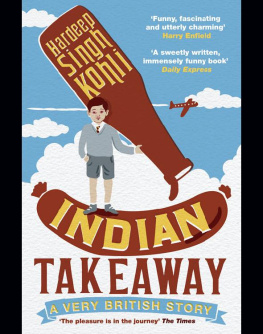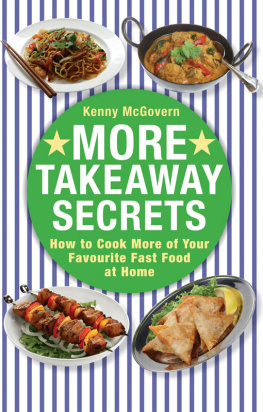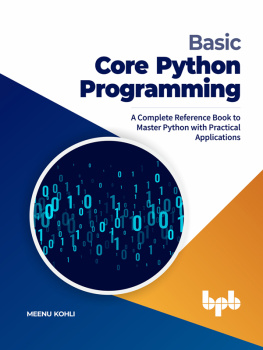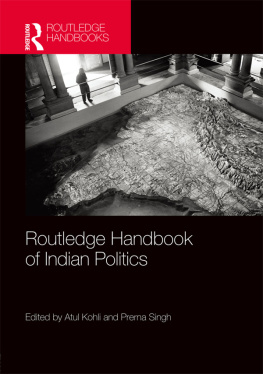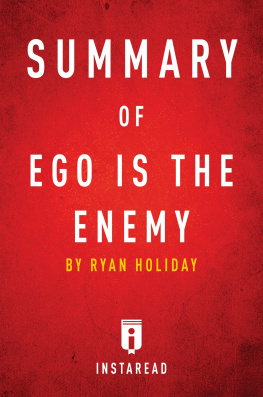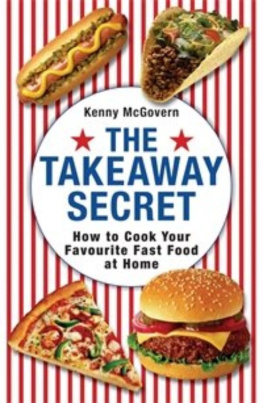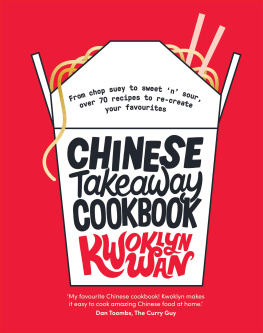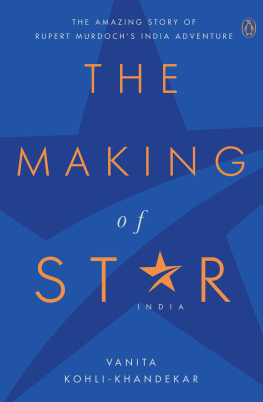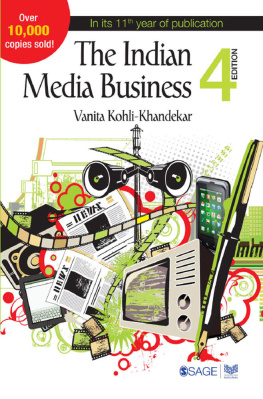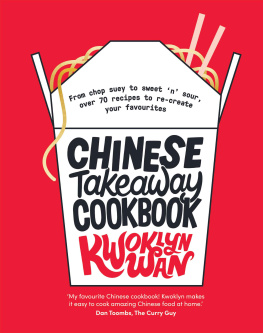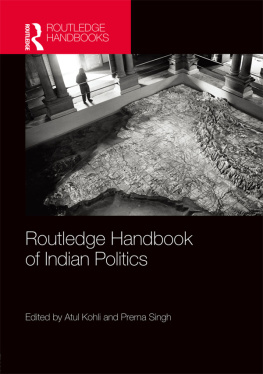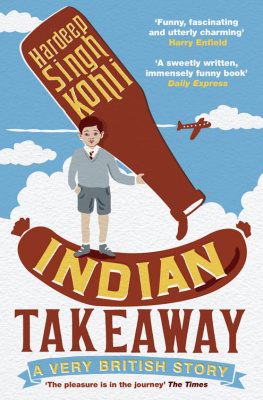Kohli - Indian takeaway: a very British story
Here you can read online Kohli - Indian takeaway: a very British story full text of the book (entire story) in english for free. Download pdf and epub, get meaning, cover and reviews about this ebook. City: Edinburgh;India, year: 2009, publisher: Canongate Books, genre: Politics. Description of the work, (preface) as well as reviews are available. Best literature library LitArk.com created for fans of good reading and offers a wide selection of genres:
Romance novel
Science fiction
Adventure
Detective
Science
History
Home and family
Prose
Art
Politics
Computer
Non-fiction
Religion
Business
Children
Humor
Choose a favorite category and find really read worthwhile books. Enjoy immersion in the world of imagination, feel the emotions of the characters or learn something new for yourself, make an fascinating discovery.
- Book:Indian takeaway: a very British story
- Author:
- Publisher:Canongate Books
- Genre:
- Year:2009
- City:Edinburgh;India
- Rating:5 / 5
- Favourites:Add to favourites
- Your mark:
- 100
- 1
- 2
- 3
- 4
- 5
Indian takeaway: a very British story: summary, description and annotation
We offer to read an annotation, description, summary or preface (depends on what the author of the book "Indian takeaway: a very British story" wrote himself). If you haven't found the necessary information about the book — write in the comments, we will try to find it.
Kohli: author's other books
Who wrote Indian takeaway: a very British story? Find out the surname, the name of the author of the book and a list of all author's works by series.
Indian takeaway: a very British story — read online for free the complete book (whole text) full work
Below is the text of the book, divided by pages. System saving the place of the last page read, allows you to conveniently read the book "Indian takeaway: a very British story" online for free, without having to search again every time where you left off. Put a bookmark, and you can go to the page where you finished reading at any time.
Font size:
Interval:
Bookmark:
For the big fella


 H ome.
H ome.
The most innocuous and yet the most complex of words. Both comforting and confusing.
I grew up on an estate in the north of Glasgow, a place called Bishopbriggs. It was a slightly over-planned sixties-built concept estate; basically a load of Wimpey houses on a few fancy little streets with slightly avant-garde names like Endrick Bank, Lyne Croft and Bowmont Hill.
It was down Bowmont Hill that my idyllic childhood collided with Glaswegian reality. It was the height of the summer holidays and all the kids on the estate ended up playing together in the street. The craze that summer was for home-made ice lollies. It seemed every freezer in every house contained moulds filled with any variety of frozen concoction. The kids would pile back to each others houses to try the latest home-made blend. I recall being rather taken with a milk and Coke version. Then, one day, we ended up heading into the garden of some random child. There must have been eleven or twelve of us. We were met at the garden gate by his mum who allowed every child in, every child with the exception of me. She looked at me rather pointedly.
Youse can all come in but not him
It was clear that I was not welcome. I stood on the pavement, numb, watching the backs of my friends as they disappeared into the garden and left me on my own.
I had no idea why I had been singled out, and ran home crying. But my mum knew exactly why I had been ostracised.
Dont worry, she told me. This is life; what can you do? It is not our job to rock the boat.
It was clear that she felt that we were visitors in another mans country. Well, maybe she felt like a visitor, but I was born in this country. I felt compelled to rock as many boats as they would let me board. I had no knowledge of anywhere else, of anytime else. Glasgow in 1974 was the beginning, middle and end of my reality.
I cant say I have ever forgotten that feeling of standing alone on Bowmont Hill. Those are the sorts of experiences that never soften with time; they stay with you; you replay them in your head so that the next time it happens, you will be better prepared. Unfortunately, there was no shortage of next times.
As I got older I would be asked time and again where home was and they would laugh when I suggested Glasgow. Where do you come from? they would ask, adding: Originally, if I was glib enough to suggest the Great Western Road. Implicit in all of their interrogations was the accusation that I did not belong, that I was other, that my home was not here. To them I could never be Scottish.
Yet neither did I feel particularly Indian. Of course, I was born to Indian parents and grew up in an Indian house. But that Indian house was always somewhere in Glasgow. It was all very confusing.
As a young child my sense of self was a cultural car crash, a collision between the values of my parents and the ridicule of the playground. In those days it was commonplace for my brothers and me to be referred to as chocolate drops, which I preferred to the more casually vicious darkie. (Perhaps this is why I have never been a great fan of chocolate drops.) The perception of India was that all Indians were smelly, smelling, presumably, of curry. The fact that Britain later adopted Indian food as its own was an irony lost on Charlie McTeer, the celebrated school thug, as he spent the entire day with a clothes peg on his nose, complaining of the aroma that apparently emanated from my body. I have to confess to having been unaware of any smell, other than my mums spittle from where she had invariably cleaned some breakfast off my face.
Yet, this idea of India was radically different from the place I watched on TV or saw splashed across the newspapers. The Indians I saw on TV were either starving or poor or both; cyclone-hit Bangladeshis, emaciated and barely alive. Surely this was not where I fitted in?
As I grew older, perceptions of India changed. I became aware of the more spiritual side of India through the Beatles and their beads and cheesecloth, and their discovery of their guru, the Maharishi Mahesh Yogi. I remember being faintly embarrassed by the idea of this bearded Svengali owning a legion of Rolls Royces in a country which was in the throes of famine and pestilence. The India of the early 1980s was a world away from the economic superpower it is today. I didnt understand how, to the young, free-minded, drug-addled youth, India was a place worth visiting. India was the home of mysticism, the epicentre of spirituality, the birthplace of religious civilisation. But I found it impossible to access any of the cool associated with that world. Lank-haired hippies would trail their way across three continents to find themselves in the warm waters of the Arabian Sea in Goa. I never quite grasped how this worked, or what they did once they found themselves. What did anyone hope to find in India that wasnt already present in their Scottish life? I had spent most of my childhood being ridiculed for being Indian and yet here were these white folk off to the selfsame country to find enlightenment.
And then there was the Kama Sutra. Why did the KamaSutra have to be Indian? The idea of an ancient book all about sex with drawings could not have been further from my experience of India. In my house I never saw my parents kiss, and still never have. My mum gets a hug once a year on her birthday and a sideways hug at that, lest there be any intimacy. I would be appalled if my mother or father ever used the word love in relation to each other. I know they love each other; they have been together for over forty years and have slowly, through the attrition of time, moulded each other into shapes that fit together; much like pebbles on the seashore.
But then again, my India was just a version of India as defined through a childhood in Glasgow. Sunday was our day to be Indian. After a week of mundane Scottish life, my mother would wrangle her three sons into smart clothes and assault us with a damp facecloth before tramping us off with our dad to experience the delights of the gurdwara, the Sikh temple. I never understood why we had to be smartly dressed to visit the temple. If, as my mother so very often told me, God (who was omnipotent and omniscient and all other words beginning with omni-) judged who we were rather than how we appeared, then why did we need to ensure that our trousers were freshly pressed and our shirts free of ketchup? This philosophical musing of an eight-year-old was often met with the counter-argument of a skelp across the back of the thighs.
Temple was great. The religious component of praying and being holy was simply one of a myriad of activities that took place in what was no more than a rundown, near-derelict house on Nithsdale Drive in the Southside of Glasgow. As kids we mostly ran around at breakneck speed in our ironed trousers and ketchup-free shirts, trying our best to crumple our trousers and mark our shirts with ketchup. Gurdwara was where the entire community gathered; it was our parents single chance to re-engage with Sikhism and Sikh people. It must have been a blessed relief for them to feel relaxed amongst their ain folk, for at least one day of the week. When I think about the hard time I used to get as a small brown boy in Glasgow, I forget that my parents had to deal with yet more abuse in a more sinister, less forgiving adult world.
Font size:
Interval:
Bookmark:
Similar books «Indian takeaway: a very British story»
Look at similar books to Indian takeaway: a very British story. We have selected literature similar in name and meaning in the hope of providing readers with more options to find new, interesting, not yet read works.
Discussion, reviews of the book Indian takeaway: a very British story and just readers' own opinions. Leave your comments, write what you think about the work, its meaning or the main characters. Specify what exactly you liked and what you didn't like, and why you think so.

